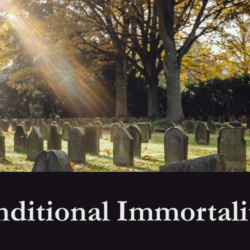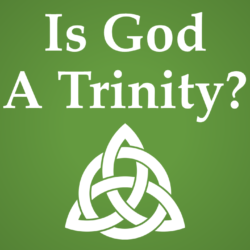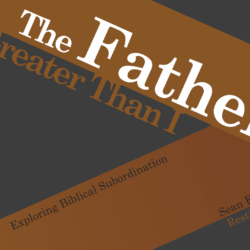Today we’ll take a look at a number of confusing scriptures that seem to indicate that hell is a place where the wicked are consciously tormented forever. We’ll look at texts that talk about weeping and gnashing of teeth as well as the how the worm will not die nor the fire be quenched. We’ll consider biblical phrases like “eternal punishment,” “eternal fire,” and “everlasting contempt.” Last of all we’ll analyze two verses in Revelation that use the language of eternal torment to describe the final punishment.
—— Notes ——
State the Doctrine Simply
The biblical punishment for the wicked is destruction not an eternal life of torture. This is why we find scores of text that use words like perish, cut off, and death to describe the fate of the wicked.
Texts that Support This Teaching
Gen 2.17; 3.19, 22-23; 5.5; Ps 37.2, 9, 10, 20, 22, 27, 28, 34, 36; Mal 4.1-3; Mt 3.12; 7.13-14; 10.28; 18.8-9; Jn 3.16; Rom 6.23; Gal 6.8; 1 Tim 1.17; 2 Tim 1.9-10; Heb 10.26-27; 2 Pet 2.6; 3.6-7; 1 Jn 5.11-12; Jud 1.6-7
Logical Arguments that Support This Teaching
- If Jesus paid our penalty for sin and the penalty for sin is eternal conscious torment, then Jesus had to suffer eternal conscious torment. However, Jesus suffered temporary torture followed by death.
- What does it say about God that he set up our world to be such that those who refuse him must suffer day and night forever and ever without relief? How is he a God of love?
- Justice is proportional so if a man sins for 80 years, he should not suffer eternally. If God punishes people infinitely for a finite number of sins, then this is unjust.
Difficult Texts[1]
Weeping and Gnashing of Teeth in Fire/Outer Darkness
Matthew 8.11-12 (cp. 13.42)
11 I tell you, many will come from east and west and recline at table with Abraham, Isaac, and Jacob in the kingdom of heaven, 12 while the sons of the kingdom will be thrown into the outer darkness. In that place there will be weeping and gnashing of teeth.”
- “weeping and gnashing of teeth” says nothing about the duration of a punishment. If someone faces judgement they are likely to weep and gnash, whether it is temporary or ongoing.
- “weeping” connotes grief and “gnashing of teeth” anger not suffering
- In the stoning of Stephen the mob got so angry that gnashed their teeth
Acts 7.52-54
52 Which of the prophets did your fathers not persecute? And they killed those who announced beforehand the coming of the Righteous One, whom you have now betrayed and murdered, 53 you who received the law as delivered by angels and did not keep it.” 54 Now when they heard these things they were enraged, and they ground their teeth at him. [NASB: “they began gnashing their teeth at him”]
- Acts 7.54 ἔβρυχον τοὺς ὀδόντας
- Matthew 8.12 ὁ βρυγμὸς τῶν ὀδόντων.
Unquenchable Fire, Worm Does Not Die
Matthew 3.11-12
11 “I baptize you with water for repentance, but he who is coming after me is mightier than I, whose sandals I am not worthy to carry. He will baptize you with the Holy Spirit and fire. 12 His winnowing fork is in his hand, and he will clear his threshing floor and gather his wheat into the barn, but the chaff he will burn with unquenchable fire.”
- unquenchable fire is a fire that cannot be put out
- it refers to the quality of the fire not to its duration
- have you ever seen a fire raging so hot, you could not put it out if you tried?
- think of forest fires in California; they are unquenchable
Mark 9.47-48
47 And if your eye causes you to sin, tear it out. It is better for you to enter the kingdom of God with one eye than with two eyes to be thrown into hell, 48 ‘where their worm does not die and the fire is not quenched.’
- This verse quotes from Isaiah 66.24
Isaiah 66.22 “For as the new heavens and the new earth that I make shall remain before me, says the LORD, so shall your offspring and your name remain. 23 From new moon to new moon, and from Sabbath to Sabbath, all flesh shall come to worship before me, declares the LORD. 24 “And they shall go out and look on the dead bodies of the men who have rebelled against me. For their worm shall not die, their fire shall not be quenched, and they shall be an abhorrence to all flesh.” - the context is indubitably eschatological as evidenced by v22 and the entire chapter
- this scene picture rotting corpses that maggots are eating and raging fire is consuming, not living beings
- imagine a final battle where many soldiers lay dead, their corpses strewn about on the battlefield, soaking it with their blood. The victors come through and collect all the bodies to bury or burn them. What sort of fire would it take to burn dead and partially decomposed cadavers? Only an intensely raging inferno could hope to burn them.
- Recalling Jesus’ words “their worm does not dire and the fire is not quenched” refers to the worm and the fire not to living beings or even the dead bodies. The corpses’ worms will not die, presumably until they consume all that they can. Likewise, the fire remains unquenched and burning hot until it consumes whatever fuel is available.
Eternal Punishment, Eternal Fire, Everlasting Contempt
Daniel 12.2
2 And many of those who sleep in the dust of the earth shall awake, some to everlasting life, and some to shame and everlasting contempt.
- first note the contrast
- the righteous get “everlasting life”
- the wicked get “shame everlasting contempt”
- it would violate the parallelism for the wicked to get everlasting life in hell
- shame and contempt can refer to either the wicked person’s feelings or the righteous
Isaiah 66.24
24 “And they shall go out and look on the dead bodies of the men who have rebelled against me. For their worm shall not die, their fire shall not be quenched, and they shall be an abhorrence to all flesh.”
- the word translated “abhorrence” here is the same as the word “contempt” in Daniel 12.2–דֵּרָאוֹן, and these are the only two places in the Hebrew Bible where that word occurs. The context of Isaiah 66.24 is the final judgment and the “abhorrence” or “contempt” is certainly not felt by the dead, maggot-infested corpses, but by the living who see the macabre scene and experience revulsion.
Matthew 18.8
8 And if your hand or your foot causes you to sin, cut it off and throw it away. It is better for you to enter life crippled or lame than with two hands or two feet to be thrown into the eternal fire.
- first, “eternal” modifies “fire” not the experience of those thrown into it
- even if the fire last forever, we have no reason to assume those thrown into it will miraculously regenerate to allow eternal torment
possibilities for eternal fire
- the fire burns forever. After consuming the unrighteous, the fire continues to burn for all time as a memorial
- “eternal fire” is prophetic hyperbole, maybe in that it’s experience is so painful that it seems like it goes on forever or that it does in fact go on for a long period
- The fire may burn throughout the millennium age. At the end of the millennium the devil gets thrown into the lake of fire where the beast and false prophet were (Rev 20.10)[2], but they were thrown in at the coming of Christ (Rev 19.20)
- “eternal fire” is “fire of the age (to come)”, in other words it’s the kind of fire that belongs to that age. It’s age-to-come fire as opposed to this-age fire.
- eternal = αἰώνιος, αἰώνιον = age-ish
Jude 1.7
7 just as Sodom and Gomorrah and the surrounding cities, which likewise indulged in sexual immorality and pursued unnatural desire, serve as an example by undergoing a punishment of eternal fire.
- How long did the fire God sent down on Sodom and Gomorrah last?
- The angels say “the LORD has sent us to destroy it” (Gen 19.13)
- The fire was going to be extremely intense. Leaving the city wasn’t good enough to find safety. “Escape to the hills, lest you be swept away.” (Gen 19.17). The destruction destroyed an entire area. “24 Then the LORD rained on Sodom and Gomorrah sulfur and fire from the LORD out of heaven. 25 And he overthrew those cities, and all the valley, and all the inhabitants of the cities, and what grew on the ground. (Genesis 19.24-25)
Genesis 19.27-28
27 And Abraham went early in the morning to the place where he had stood before the LORD. 28 And he looked down toward Sodom and Gomorrah and toward all the land of the valley, and he looked and, behold, the smoke of the land went up like the smoke of a furnace.
- this is what Jude calls “a punishment of eternal fire”
- The biblical focus is on intensity not duration. In fact, there’s nowhere that tells us how long the fire burned.
- Also, Jude does not say S&G was an example of eternal fire, as if eternal fire would be like S&G is like it, except it would go on forever. Rather Jude says S&G “serve as an example by undergoing a punishment of eternal fire.” What S&G suffered was eternal fire!
2 Peter 2.6
6 if by turning the cities of Sodom and Gomorrah to ashes he condemned them to extinction, making them an example of what is going to happen to the ungodly;
- S&G got turned to ashes and extinction
Jonah 2.5-6
5 The waters closed in over me to take my life; the deep surrounded me; weeds were wrapped about my head 6 at the roots of the mountains. I went down to the land whose bars closed upon me forever; yet you brought up my life from the pit, O LORD my God.
- Jonah’s prayer from within the fish includes his feeling that he had been locked away in the ocean forever, but in the next breath he recounts how God brought his life from the pit
- so, αἰώνιος can refer to the feeling of lasting forever, as when enduring intense suffering (in this case drowning)
Matthew 25.41, 46
41 “Then he will say to those on his left, ‘Depart from me, you cursed, into the eternal fire prepared for the devil and his angels. …46 And these will go away into eternal punishment, but the righteous into eternal life.”
- We’ve already discussed eternal fire, but this verse really fits well with Rev 20.10, 15 (discussed in just a minute or two)
- eternal punishment can refer to
- 1: a punishment that one experiences for a long time or forever
- 2: a punishment whose effects continue forever
- ie. the death penalty is an eternal punishment because once it’s carried out it is irreversible and lasts forever, however the experience of execution may have been very quick
- Other examples of a “noun of action” include “eternal judgment” (Heb 6.2), “eternal salvation” (Heb 5.9), “eternal redemption” (Heb 9.12)
- in all these cases it’s a judgement whose results lasts forever, a salvation that lasts forever, a redemption that lasts forever, a punishment that lasts forever
Revelation Texts, Tormented Day and Night Forever
Revelation 14.9-11
9 And another angel, a third, followed them, saying with a loud voice, “If anyone worships the beast and its image and receives a mark on his forehead or on his hand, 10 he also will drink the wine of God’s wrath, poured full strength into the cup of his anger, and he will be tormented with fire and sulfur in the presence of the holy angels and in the presence of the Lamb. 11 And the smoke of their torment goes up forever and ever, and they have no rest, day or night, these worshipers of the beast and its image, and whoever receives the mark of its name.”
Revelation 20.10
10 and the devil who had deceived them was thrown into the lake of fire and sulfur where the beast and the false prophet were, and they will be tormented day and night forever and ever.
- Revelation uses a lot of symbology and visions
- important to distinguish between the vision and the reality it points to
- no question that in John’s vision he saw a fire where people were tormented day and night forever and ever
- however, he also saw a woman sitting on a scarlet beast w/ 7 heads and 10 horn. do we take that literally?
- this woman represents Babylon, the final human city opposed to God
- the smoke of her (Babylon’s) torment goes up forever and ever
Revelation 19.2-3
2 for his judgments are true and just; for he has judged the great prostitute who corrupted the earth with her immorality, and has avenged on her the blood of his servants.” 3 Once more they cried out, “Hallelujah! The smoke from her goes up forever and ever.”
- this hyperbolic language hearkens back to the destruction of Edom
Isaiah 34.9-11
9 And the streams of Edom shall be turned into pitch, and her soil into sulfur; her land shall become burning pitch. 10 Night and day it shall not be quenched; its smoke shall go up forever. From generation to generation it shall lie waste; none shall pass through it forever and ever. 11 But the hawk and the porcupine shall possess it, the owl and the raven shall dwell in it. He shall stretch the line of confusion over it, and the plumb line of emptiness.
- is there a place in the Middle East where Edom used to be that goes on burning year after year?
- imagery of torment and smoke rising forever connotes fierce and irreversible destruction not ongoing suffering
- what we see with Edom and Babylon is the same as those who get the mark of the beast
- they will be destroyed
- after all, we’re told the lake of fire just is the second death
Revelation 21.8
8 But as for the cowardly, the faithless, the detestable, as for murderers, the sexually immoral, sorcerers, idolaters, and all liars, their portion will be in the lake that burns with fire and sulfur, which is the second death.”
Revelation 20.14
14 Then Death and Hades were thrown into the lake of fire. This is the second death, the lake of fire.
- so getting tormented in the lake of fire is the image, but the meaning is destruction
- similarly, the image is of a beast, but the interpretation is of a kingdom opposing God
——————————————————
[1] A phenomenal resource is rethinkinghell.com, specifically http://www.rethinkinghell.com/explore/?doc
[2] Note the translation difference between ESV “where the beast and the false prophet were” and the NASB “where the beast and the false prophet are.” The verb “to be” is not present so it’s up to the translator what tense to use.
—— Links——
- see RethinkingHell.com for lots of resources on annihilationism
- check out the Chris Date vs. Phil Fernandez debate on hell
- See other episodes in this Theology Class
- Find more Restitutio classes here
- For more posts on hell, see these posts
- Intro music: Jazzy Frenchy by bensound.com. Licensed under Creative Commons: By Attribution 3.0 License.







